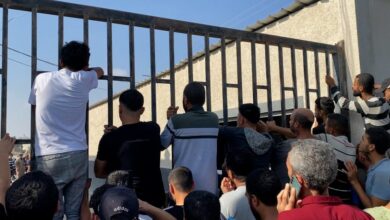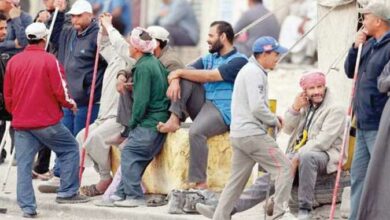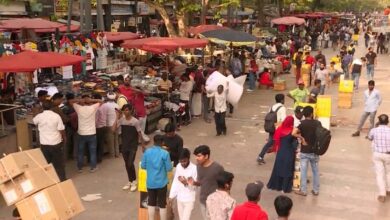Around 100 members of the "Sacked Workers' Front" convened for their first conference on Wednesday, with the stated goal of reinstating some 12,000 workers and employees who have been punitively laid off from work for demanding improved working and/or living conditions.
The front’s four primary goals are the reinstatement of fired workers, full-time contracts for full-time work, compensating dismissed workers and renationalization of privatized companies.
According to their online declaration, further objectives include demanding an end to punitive layoffs, dismissals, and relocation, as well as military trials for protesting workers, among other “systematically punitive measures."
This week, the Sacked Workers’ Front filed an appeal to the public prosecutor’s office regarding employers’ violations of labor rights and industrial safety measures, along with documented evidence of financial irregularities and/or unpaid wages.
According to the front’s page on Facebook, this group has also presented their demands to President Mohamed Morsy and his staff, whom they hope will support their demands "if they really believe in social justice."
Despite its clear objectives, disagreements have hovered over the Sacked Workers’ Front, especially regarding the sponsors of this latest effort. Some labor activists working toward similar objectives over the past three years claim that this front is an attempt by the state-controlled Egyptian Trade Union Federation (ETUF) to hijack their previous efforts and claim them as their own.
According to Karim Reda, a worker-activist and blogger fired from his job around three years ago at the Petrotrade Company, which is affiliated with the Petroleum Ministry, "We are looking to revive previous efforts for the reinstatement of punitively sacked workers."
Reda pointed out that there had been a campaign for dismissed workers’ rights dubbed Mesh Hankhaf (We won’t be afraid) organized by the independent Tadamon (Solidarity) Network. "Yet as far as I’m aware, this campaign has ceased to function since the 25 January Revolution."
Being one of the organizers in the Sacked Workers’ Front, Reda claimed that this latest initiative came from a group of labor journalists in the (left-leaning) Tagammu Party. “It was not organized by the ETUF. They only authorized the staging of our conference at their Workers’ University."
At the front’s first conference, tens of sacked workers from different companies and sectors spoke of their grievances and how they could coordinate their labor struggles.
The conference at the Workers’ University in the Nasr City district of Cairo was attended by fired workers from private sector companies, a number of privatized companies, and a handful of public sector service companies.
Amongs those present were workers sacked from multinational companies, including the Suzuki Motor Corporation and the petroleum services company Schlumberger. A host of workers from different public sector gas and petroleum companies also attended the conference, along with workers from private (and privatized) textile companies, an electronic appliances company, tobacco and food processing factories, as well as iron and steel works.
The founding members of the Sacked Workers Front hail from Alexandria, Cairo, Giza, Monufiya, Fayoum, and Sadat Industrial City, although some founders pulled out of the front upon learning that the ETUF was involved in this initiative.
"We chose to pull out of the front because it is being organized by the ETUF," said Ragab al-Sheemy, a laborer at the Indorama Shebin al-Kom Textiles Company.
"Although many of our coworkers have been sacked, and we are on our way to joblessness, and although our [local trade union] committee is affiliated to the ETUF, we have chosen to distance ourselves from this campaign, as it is merely an attempt on their behalf to capitalize on workers’ grievances," he added.
Sheemy stressed that the members who left the front "refuse to coordinate or work with [ETUF President] Ahmed Abdel Zaher. Furthermore, from experience we know that the ETUF will not help us be reinstated in our jobs. Nor will it help re-operate our company."
However, a sacked worker from the TeleMisr Company, Saadiya Mahmoud, said that the Sacked Workers’ Front is independently organized and not affiliated to any party or union.
"Although we are dues-paying members of the ETUF, they did not sponsor our conference, nor did they attend it." Mahmoud asserted.
"This front may bring about progressive changes and reclaim workers rights, yet it is not likely to succeed in reinstating 72 workers sacked from the Petrotrade Company; or other public sector petroleum companies," Reda said.
He explained that these 72 workers were punitively laid off for demanding the establishment of local trade unions at the Petrotrade Companies, while others were sacked from work during their (conscripted) military service and still others were fired for protesting in demand of full-time contracts and/or improved working conditions.
According to Fatma Ramadan, a labor organizer with Tadamon and the Egyptian Federation of Independent Trade Unions: "If they have enough participants from enough companies and sectors then this front may succeed. Otherwise, it will likely end up being isolated and marginalized."
Ramadan expressed her dismay regarding the front’s coordination with the Tagammu Party and the ETUF. "We have been coordinating with many of these sacked workers through the Mesh Hankhaf campaign for over two years. Given that the ETUF has let them down so many times before, I don’t understand why they’d move back into the ETUF’s sphere of influence?"
Mahmoud, however, argued that the front is not moving into the ETUF’s sphere of influence. "We tried to book a conference hall in the Journalists Syndicate, but they told us it would cost LE10,000. Given that we are unemployed, we did not have this sort of money to dish out."
The Sacked Workers’ Front held its first conference at the Workers’ University "because the ETUF offered to let us use the conference hall at the university free of charge," Mahmoud insisted. "We only want to organize ourselves for our rights and for the rights of our country. First and foremost, we are concerned about the welfare of our company and our national economy."
Hanafy Eid, treasurer of the TeleMisr local union committee, said, "We did not have enough participants at this first conference to make enough of a difference. Moreover, ETUF representatives were not present at this conference, although we had hoped that they would be."
Eid pinned his hopes on Egypt’s new president. “We have hope that President Morsy can help us regain our basic rights. We expect that the new president and his policies will support those workers who have been punitively sacked, and we hope that his policies will be able to revitalize the economy, including the public, private, and informal sectors.”
“The Sacked Workers’ Front hopes for a larger turnout in order to better represent Egypt’s 12,000 sacked workers. We hope for a better organized second conference [scheduled for 15 August]," Eid added.
"I don’t know where they’re getting this figure of 12,000 sacked workers from," Ramadan said. "We know of around 500 workers who were sacked due to their labor activism, or were punitively laid off for their unionism. However, is difficult to gauge the actual number of punitively sacked workers or employees across the country."
Ramadan concluded that "this number could be exponentially higher than 12,000 if you include all the companies that have ceased production, have been downsized, or liquidated."
Nagy Rashad, an independent member of the ETUF’s caretaker board, confirmed that the state-controlled union had indeed organized this conference under its auspices. "The ETUF may have hosted the front as a publicity act or a media show."
“I don’t know what the intentions of this front are, but they have put the burden of responsibility on the ETUF’s shoulders. This federation is being put to the test once again," said Rashad.
"I support independent unionism, even if it is held under the auspices of the Workers’ University," he added. "The ETUF now bears the burden of reinstating those workers who were punitively sacked from their workplaces."
Rashad is "not very optimistic regarding the reclamation of sacked workers’ rights via the ETUF… in light of the policies of business tycoons like [Ceramica Cleopatra owner] Mohamed Abul Enein who are threatening to shut down their companies and lay off thousands more workers."
"We will work to make sure that such mass layoffs do not take place. We hope that the front will be able to help workers organize themselves. We also hope for a better organized conference next month. Such initiatives require support from unions, political parties and NGOs."




